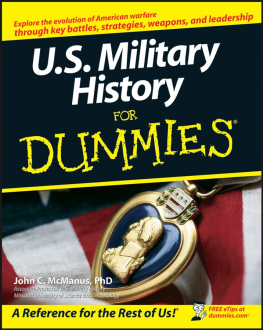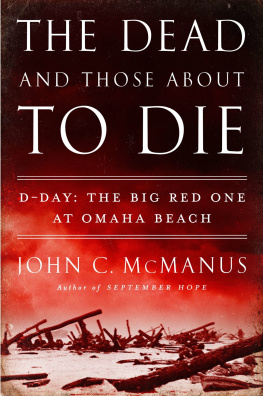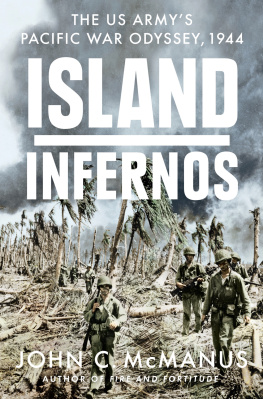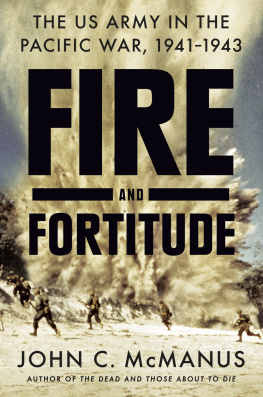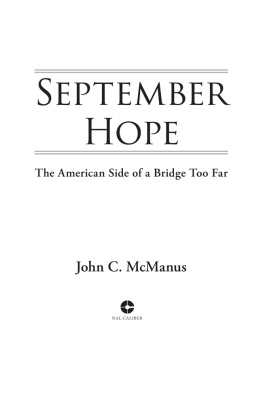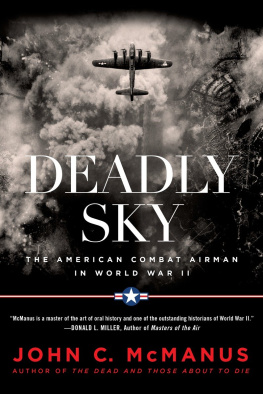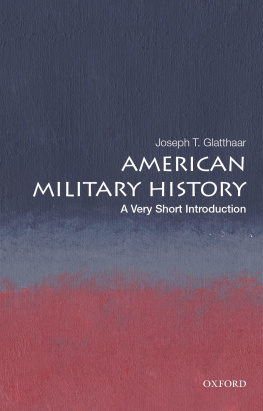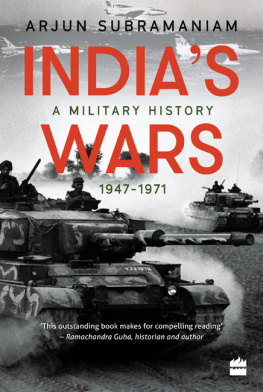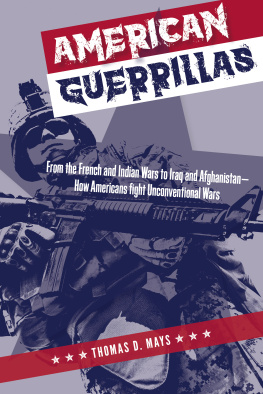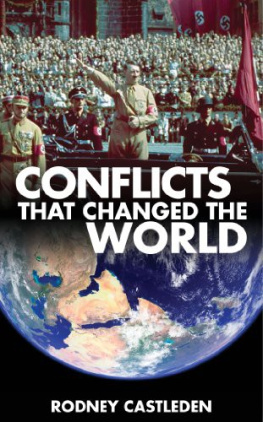Chapter 1
Why This Stuff Is Important
In This Chapter
Shaping the nation through war
Seeing how wars of the past affect you today
Meeting the storytellers of history
T he U.S. military doesnt exist, as some people argue, to kill people and break things. Quite simply, it exists to provide security for the American people. Sometimes that does indeed mean killing people and breaking things. Other times, it means precisely the opposite. In World War II, the armed forces, in order to protect America, had to destroy the enemys armed forces in conventional combat. However, during the Cold War, the militarys primary focus was to prevent a catastrophic World War III by maintaining peace rather than making war.
Basically, U.S. military history is the story of how weve maintained our security and how we can continue to do so in the future. That means military history actually affects your life.
Security is the basic necessity of life. Without security, nothing works. Security is sort of like your health. If you dont have your health, youre in deep trouble. If you do, then its easy to take it for granted. Imagine, for just a moment, if your life were devoid of security. For the purpose of self-defense, your home would be a bunker, with no creature comforts, not even electricity or indoor plumbing because those things are the product of stable communities and foresighted engineering. With no police, firefighters, or soldiers, your main focus would be to protect your family from predators. There would be no supermarkets, no Starbucks, no local mall, and (gasp!) no bookstores. Instead, your existence would be governed by the law of the jungle. Not a pretty picture, is it? Sadly, conditions similar to these exist in far too much of the world.
But Americans are fortunate. We enjoy relatively peaceful, stable lives that come from our collective security as a country. We live in safe homes, drive on regulated, fairly well-maintained roads, shop at secure businesses, and work in safe, peaceful jobs. In truth, none of these blessings can exist without you guessed it security. And, for America, that security comes from the armed forces, which are made up of individual Americans.
One of the most fascinating aspects of U.S. military history is that its largely the story of ordinary Americans in extraordinary circumstances. Perhaps thats why most of us are so moved by it. Plus, if you know military history, you know American history, because theyre closely intertwined. You also begin to understand where security our most basic necessity actually comes from.
The purpose of this chapter, then, is to explain what U.S. military history is, how profoundly it has affected our countrys development, and why its important to your life.
Shaping a Country through War
Americans like to think of themselves as peace-loving people. To some extent, the characterization fits. Most Americans tend to think of war as unusual and quite undesirable, something to be avoided if at all possible. To them, peace is the norm, war is the aberration. Security is a given. Violence and chaos are only frightful exceptions to an otherwise orderly existence. Throughout American history, only a minority of Americans have ever fought in combat. All of this is obviously a good thing.
However, there is no question that war is a central theme in American history. War created this country, shaped it, and propelled it into world-power status. It is literally impossible to study American history without studying war. By my count and this is a conservative estimate Americans have fought and died in well over 100 wars since colonial times. Those wars ranged in size from small skirmishes against Native American tribes to World War II, the largest conflict of all time. Like it or not, American history is really something of a Jekyll-and-Hyde duality between the peaceful and warlike sides of America. For this reason, military issues relate to almost every aspect of the American story. And this story that loops from the past into the present touches you in more ways than you may be aware.
Reaping the sociological and political rewards of war
Military conflict has decided a large number of major issues in U.S. history. Thats the essential paradox of America. A country founded on notions of representative government, peaceful compromise, tolerance, and universal human rights nonetheless resolved many of its conflicts through violence. Heres a brief list that demonstrates the momentous effect of wars on the development of the United States as a nation:
The Revolutionary War (see Chapters 6 and 7) created an independent American republic. The War of 1812 (see Chapter 9) solidified that independence and gave Americans permanent control of the Mississippi River. This led to massive economic growth.
Wars against Native Americans (see Chapters 8 and 12) led to the precipitous decline of Indian cultures in this country. Those wars also expanded the United States across the continent, creating a coast-to-coast nation built around the Constitution.
A war with Mexico (see Chapter 10), fought in 1846 and 1847, won control of the entire Southwest for the United States.
The Civil War (see Chapter 11) destroyed slavery, propelled race to the forefront as a thorny American issue, and guaranteed that the United States would develop as a free-market, capitalist, multiethnic republic.
The Spanish-American War (see Chapter 13) led to colonial commitments for America overseas.
World War I (see Chapter 14) created widespread disillusionment with the idea of war itself. It also furthered the idea that Americans should remain aloof from world affairs. This notion, known as isolationism, still exists in American political thought.
World War II (see Chapter 16) turned the United States into a world-leading power of immense proportions. It also sparked major changes in race relations, gender roles, economic growth, political norms, and lifestyles.
The Vietnam War (see Chapter 19) proved the limits of American power. It caused many Americans to question the countrys basic morality. The war also spawned massive social protest movements, the ripples of which we still feel today.
Remember that those are just a few examples, among many. Nor do they even take into account the militarys considerable peacetime impact on the American people throughout the span of U.S. history. The main point Im conveying is that modern America is, to a great extent, the product of its martial past.
Reaping the innovations of war
Many things you encounter in your daily life eventually relate to military history or security. Indeed, I would venture to say that nearly every product you use is dependent, in some way, upon military security. Here are just a few examples:
Automobiles: Every American automaker during World War II converted from the production of civilian cars to vehicles with a military purpose, such as tanks, trucks, planes, and jeeps. The Jeep and the Hummer originally were exclusively military vehicles. Also, civilian cars are, of course, dependent on oil-based petroleum for fuel. The United States has fought wars in the oil-rich Middle East and maintains a major military presence there to safeguard the worlds oil supply.
Cotton: This crop is, obviously, useful for making comfortable clothes. In the early 19th century, the Souths economic system was heavily dependent upon slave-based cotton production for foreign markets. This led to the growth of a slavery-centered economy, political system, and culture in the South that ultimately clashed with the Norths industrial, free-market economy, helping lead to the Civil War. The impact of the Civil Wars outcome has continued into the present with civil rights being extended to all ethnic groups. And those cotton khakis you love originated from military uniforms.

